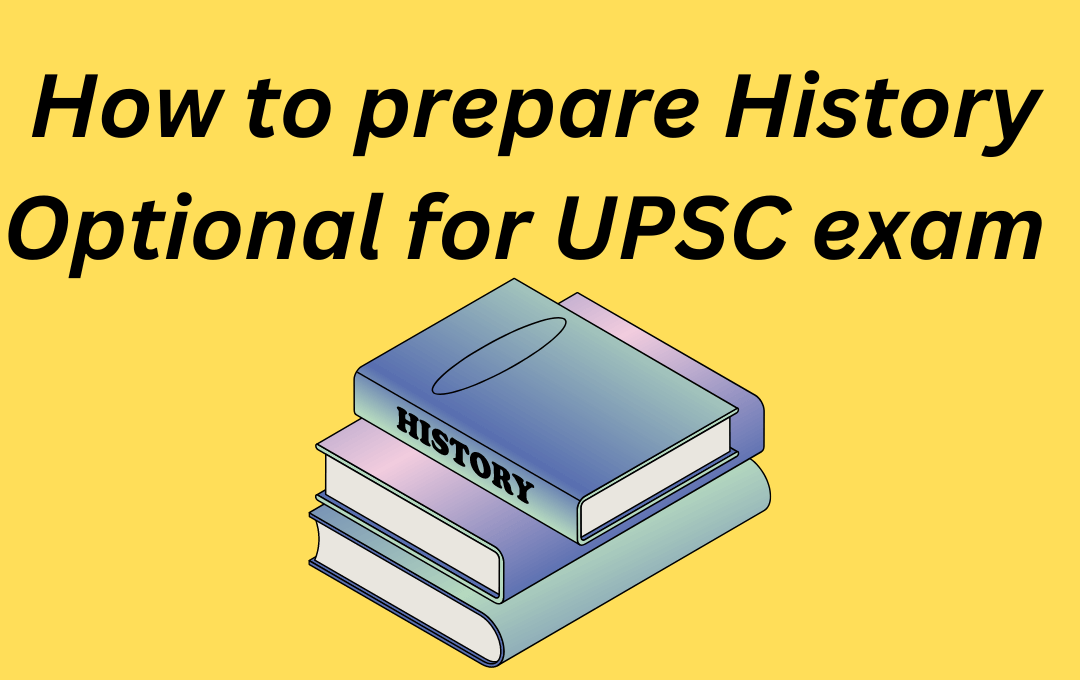The UPSC study plan includes advice on how to prepare for the Prelims, Mains, and Interview exams. One of India’s most difficult exams, the Civil Services exam attracts thousands of applicants each year, making it an extremely competitive field.
The UPSC Civil Service Examination gives major consideration to optional subjects. In the exam, one should do as well as possible. Candidates can perform well on examinations by using the right strategy and a well-managed study schedule.
One of the optional courses that are well-liked on the UPSC exam is history. The history curriculum is extensive, thus the topic requires perseverance. Although history is not a topic where you can get high scores, you can do well by adhering to a well-managed schedule.
Below are some tips and tricks to prepare History for UPSC exam
Recognize the Exam Syllabus & Pattern
Before beginning their preparation, every candidate should carefully review the UPSC test curriculum and pattern. The wide syllabus for the UPSC Exam includes practically every topic imaginable. It is so large that candidates must read it several times in order to understand it. Candidates will benefit greatly from having a clear understanding of the UPSC Syllabus and Exam Pattern.
The syllabus should be divided properly.
There are 4 sections in the History Optional syllabus, with 2 in each paper.
Paper I: Medieval and Ancient History
Paper II: Global and Modern History
Use this method of breaking up the syllabus into manageable chunks to prevent feeling overwhelmed by its size.
Also read: How to Prepare for UPSC Without coaching
Related Links
| How to prepare Polity Optional for the UPSC exam | How to prepare geography optional for UPSC |
| How to prepare Sociology Optional for the UPSC exam |
Make the Foundational Points Clear
First, you must master the fundamentals. To grasp things better, read NCERT books. These volumes contain all the fundamental ideas in general studies and history. Prior to beginning the standard textbooks for Ancient, Medieval, and Modern Indian History, finish the NCERT texts. Avoid using too many books when studying. It will make your planning difficult.
Take Notes
All subjects benefit from taking notes. Preparing notes is crucial for history classes. Taking notes will aid in your memory of crucial dates and subjects. The history curriculum is extensive, making it impossible to cover every subject. Select the most crucial ones and make notes accordingly.
Solve Previous year Exam Questions
The question bank from the previous year is quite beneficial for planning. You can clearly understand the exam’s format and which questions tend to recur. To improve your preparation even more, try to solve as many questions from last year’s exams.
Create a Good Study Plan
Making an effective study strategy is crucial to passing the UPSC CSE exam. It will assist you in developing discipline and tracking your success. Set yearly, weekly, and daily objectives. You must have the most effective UPSC preparation schedule with you in order to pass the exam. To substantially enhance your productivity quickly, you must have an excellent study schedule.
Revisions
Every subject you are studying requires review, but history requires it as a requirement. You must regularly review your daily historical preparation. You can’t recall something for very long without revising.
Leaving behind Procrastination
It’s crucial that you create a study schedule and follow it religiously. Don’t put it off. When it comes to studying for a difficult exam, time is often valuable and limited. Additionally, keep in mind that lost time cannot be recovered. Therefore, avoid delaying things.
Previous Test paper
It is essential that you complete exam question papers from prior years. This will not only make it easier for you to comprehend the exam’s requirements but will also significantly speed up how quickly you can complete the paper. If you do this, you can also time your responses more effectively.
Take practice exams / UPSC Mock Tests
Though a student doesn’t take enough practice exams, even if they are well-versed in the subjects, they may feel anxious and run out of time in the exam room. This is mostly due to the aspirants’ potential inability to keep track of time and poor time management abilities. Giving practice exams can help to avoid this circumstance.
Give yourself enough time
Even with the benefit of being simple to comprehend for people with an interest in history, the syllabus takes somewhat more than 5 months to thoroughly study. One needs to set up enough time and divide it among tasks like attending courses, taking notes, writing responses, and rewriting because there are many little notes that must be produced for such a large syllabus.
Summary of How to prepare history Optional for UPSC exam
One of the most prevalent and well-liked subjects is History. Each pro and con is distinct. If you are genuinely interested in the topic, you should make a decision. These are the benefits of selecting history as an elective. The most crucial factor in achieving high marks in history is to work hard and prepare diligently. It is simple to grasp and remember because the contents are presented in a logical order from beginning to conclusion.
